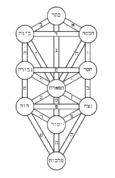 Kabbalah, also spelled Kabala or Cabala (Hebrew: קַבָּלָה literally “receiving”), is an esoteric method, discipline and school of thought. Its definition varies according to the tradition and aims of those following it,
Kabbalah, also spelled Kabala or Cabala (Hebrew: קַבָּלָה literally “receiving”), is an esoteric method, discipline and school of thought. Its definition varies according to the tradition and aims of those following it,
Kabbalah originally developed entirely within the realm of Jewish thought and kabbalists often use classical Jewish sources to explain and demonstrate its esoteric teachings. These teachings are thus held by followers in Judaism to define the inner meaning of both the Hebrew Bible and traditional Rabbinic literature, their formerly concealed transmitted dimension, as well as to explain the significance of Jewish religious observances.[2]
Traditional practitioners believe its earliest origins pre-date world religions, forming the primordial blueprint for Creation’s philosophies, religions, sciences, arts and political systems.[3] Historically, Kabbalah emerged, after earlier forms of Jewish mysticism, in 12th- to 13th-century Southern France and Spain, becoming reinterpreted in the Jewish mystical renaissance of 16th-century Ottoman Palestine. It was popularised in the form of Hasidic Judaism from the 18th century onwards. 20th-century interest in Kabbalah has inspired cross-denominational Jewish renewal and contributed to wider non-Jewish contemporary spirituality, as well as engaging its flourishing emergence and historical re-emphasis through newly established academic investigation.
Read More… http://en.wikipedia.org/wiki/Kabbalah
Learn About the Torah
